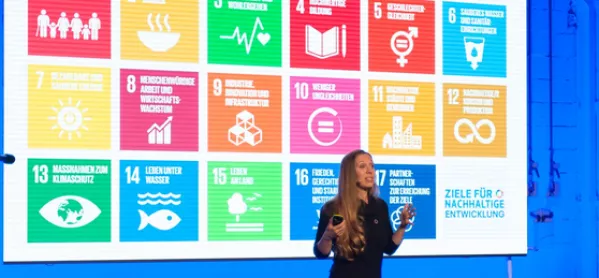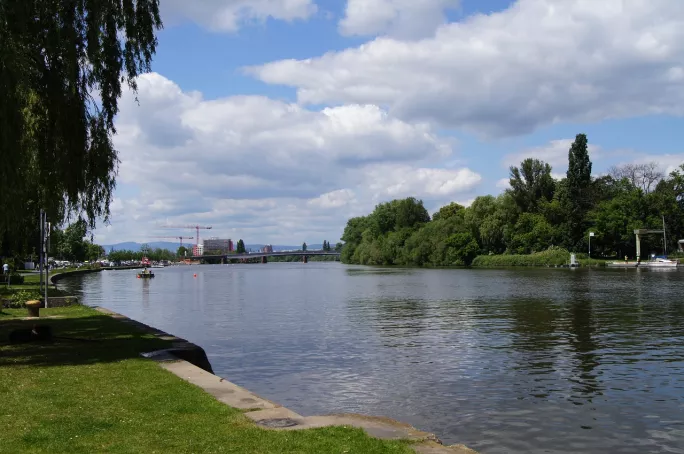- Home
- In Germany, this teacher highlights the importance of global citizenship
In Germany, this teacher highlights the importance of global citizenship

In Germany, each state decides how its education is structured.This means that there are 16 different school systems and numerous different types of schools.
Hessen, where I work and life, is considered to have an “easy” school system. Personally, I don’t think it’s “easy”, but significantly more student-orientated than some other areas.
In teacher training we’re taught how to activate students using a variety of methods and how to combine a focus on the academic with purposeful learning and students’ own interests.
Most schools have an international element - as a country, we value foreign language learning and usually have partner schools in several countries which we visit or collaborate with. Our curriculum often focuses on sustainability and social responsibility and we value the acquisition of knowledge and critical thinking skills.
Still, there is room for improvement. We don’t have standardised testing like many other countries, but we do have many written exams and they tend to influence our teaching more than many of us would like them to.
Most German teachers choose the profession for either the job security or for idealism. Many are willing to go the extra mile every day and offer extra-curricular projects and activities.
Unfortunately, the time spent on extra projects and international encounters are dependent on exam results. If everything’s going well and our pupils’ results are good, we can dedicate more time to extra-curricular. If not, all time must be dedicated to exam content. Unfortunately, the majority of teachers don’t get paid for running projects outside of the classroom, which, when all of my former students tend to remember and value this time more, is surprising.
I am a Unesco delegate for the role of education for peace and sustainable development and a founding ambassador of the #TeachSDGs movement. I’ve seen my students bloom under the ‘Making A Difference’ project in which they organise something that will make a positive impact on a community, for example, teaching healthy nutrition at a kindergarten or helping in an animal shelter.
When I introduce a new group to the United Nations’ sustainable development goals (SDGs) many of them are shocked. They aren’t aware that there’s plan for the world that countries have committed to. Many of them have a negative view of the world: they watch and read news, they learn about climate change, they don’t think there is a lot of hope and improvement. I think that we are doing a great job discussing these topics in Germany, but we need to allow for our students to have more space to care and actively make an impact on topics they find problematic.
I spend a lot of my school day trying to find the space and time for my students to discuss these ideas, and trying to influence education structure to allow an active pedagogy of global citizenship to flourish in Germany and internationally.

On a typical day I wake up at 6am and use public transport to arrive at my school, Campus Wiesbaden, by 7.45am.
I then teach 90 minutes of Advanced English with my 18-year-old students. The English curriculum is great. It focuses on culture studies, of the US, the UK and South Africa, with a focus on immigration, civil rights, social change and globalisation. I encourage my students to learn about the world, the UN, the global goals and to make international connections. To prepare for the only compulsive oral exam they have at high schools, we learn with a board game plan that includes different research tasks about globalisation that are all closely related to the SDGs. They keep a folder, in which they collect their research, questions and thoughts on international agreements, organisations and developments.
After a 20-minute break walking up and down the paths of our campus school where students are encouraged to spend every break outside, playing football and catch, table tennis and card games, I return to the classroom for a 90-minute German lesson.
Connecting 18th-century German literature to the SDGs and meaningful action is a challenge and often impossible for me. I can use it to let students examine the challenges of the time, eg regarding gender roles and social change, but rhyme, rhythm and stylistic devices as well as theoretical discussions often dominate the discourse.
In 2015, an 18-year-old-student made Germany-wide news, tweeting that she didn’t feel equipped to deal with many everyday life challenges, but that she can review and interpret poetry in four languages. Her statement was discussed widely and many believed that she spoke for a majority of students complaining about the dominance of literary analysis in our curriculum.
After a one-hour lunch break and two hours in which I go through paperwork, create lesson plans, make photocopies or digital resources for the next days, write emails to my principal, I teach my Year 11 Drama class.
We are working on a play that focuses on some of the most urgent questions my students have chosen from the list of SDGs. They are very interested in peace and politics. They are spinning ideas about world leaders replacing war with computer games, philosophising pros and cons of job loss in the military and finally creating a scene in which world leaders battle each other digitally.
Sometimes I get to teach 10 and 11-year-olds at my school when substituting for another teacher. I love connecting them to classrooms from all around the world through the Empatico platform. It only takes a few clicks to organise a video call with kids in another country and introduce each other.
In staff conferences after school, we discuss student projects and school policies. Should we keep students outside in breaks, even if it rains? Should some students be allowed to spend the break inside? Should we continue to have all students take off their shoes and does it mean we need to lead by example and wear slippers too? German schools are often very democratic and hierarchies are softer than in other countries.
I’m home by 7pm and have dinner. It’s then back to my desk to prepare lessons and exams, answer emails from international teachers and journalists on how to #TeachSDGs, connect through Twitter and prepare talks about activating students. I also write for online publications, create resources and games and send emails to people who can make a difference.
I do it all because our world deserves active global citizens and our students deserve to learn that their actions matter.
Mareike Hachemer is a high school and university teacher for English, German and Drama. She is a delegate for Role of Education for Peace and Sustainable Development of the UN and Unesco and a founding ambassador of @TeachSDGs. In her TED talk, her presentations and articles she advocates for education that puts activities for the benefit of humans and the planet at the centre of all learning. In 2015 she was a finalist of the inaugural Global Teacher Prize.
Keep reading for just £1 per month
You've reached your limit of free articles this month. Subscribe for £1 per month for three months and get:
- Unlimited access to all Tes magazine content
- Exclusive subscriber-only stories
- Award-winning email newsletters